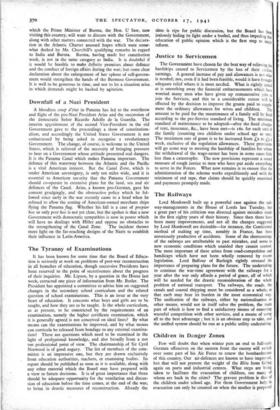Downfall of a Nazi President
A bloodless coup d'etat in-Panama has led to the overthrow and flight of the pro-Nazi President Arias and the succession of the democratic Seiior Ricardo Adolfo de la Guardia. The interim appointment of the second Vice-President in the old Government gave to the proceedings a show of constitution- alism, and accordingly the United States Government is not embarrassed by being asked to recognise a revolutionary Government. The change, of course, is welcome to the United States, which is relieved of the necessity of bringing pressure to bear on a Government whose attitude presented real dangers. It is the Panama Canal which makes Panama important. The defence of this waterway between the Atlantic and the Pacific is a vital American interest. But the Canal Zone, which is under American sovereignty, is only ten miles wide, and it is essential to American security that the Panama Government should co-operate in extensive plans for the land, sea and air defences of the Canal. Arias, a known pro-German, gave his consent grudgingly, and the obstructive policy which he fol- lowed since early in the war recently came to a head when he refused to allow the arming of American-owned merchant ships flying the Panama flag. Whether his fall is a case of propter hoc or only post hoc is not yet clear, but the upshot is that a new Government with democratic sympathies is now in power which will have no dealings with Hitler and oppose no obstacles to the strengthening of the Canal Zone. The incident throws more light on the far-reaching designs of the Nazis to establish their influence in Latin-America.


























 Previous page
Previous page